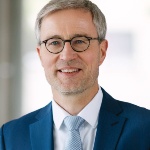The University of Stuttgart currently has two clusters of excellence and is one of the strongest locations for fundamental research in Germany. The two clusters of excellence "Integrative Computational Design and Construction for Architecture" and "Data-Integrated Simulation Science" focus on addressing current pioneering research topics while exploring new avenues of interdisciplinary collaboration. This is an excellent environment for both researchers and students, with a unique infrastructure and numerous partners from the tech-oriented Stuttgart region, and worldwide.
- Funding lines of the Excellence Strategy
Clusters of Excellence and Universities of Excellence
We conduct cutting-edge interdisciplinary research on topics of significant social and technological importance.
Prof. Peter Middendorf, Rector of the University Stuttgart
Cluster of Excellence
[Photos: Visus / University of Stuttgart, IntCDC Planungs GmbH]
Excellence in collaborative research projects
Research networks that excel in competitive selection processes and are positioned at the top of their field internationally are of paramount importance for the University of Stuttgart. These include, for example, DFG Collaborative Research Centers and DFG Research Training Groups as well as BMBF- and EU-funded large-scale projects.
Excellence in individual research
An important basis for high-caliber research is individual scientific excellence and visibility. There are numerous renowned researchers at the University of Stuttgart. They are internationally recognized and thus sought-after cooperation partners.
Excellence projects for the entire university
The University of Stuttgart has received strategy funding as part of the Excellence Strategy. This additional funding serves to strengthen the governance and strategic orientation of the university and offers members of the university many funding and participation opportunities in research, teaching and in the area of knowledge and technology transfer.
- Agility Lab
- Project for innovative management processes
- Global Glimpse
- Short term-stays abroad for early career researchers and staff from teaching and administration as part of the Global Glimpse funding program.
- Interchange Forum for Reflecting on Intelligent Systems – SRF IRIS
- Scientific network for reflecting on intelligent systems
- JoinUS
- Platform for scientific career options at the University of Stuttgart
- School for Talents
- Support program for talented students
- Strategy Dialogues
- Collaborative forums for shaping the university’s future
- Terra Incognita Fonds
- Funding program for bold research
Previous success in the Excellence Initiative
The expertise and team spirit of Stuttgart's scientific community has led to several achievements in the federal- and state-funded Excellence Initiative, the predecessor of the Excellence Strategy. From 2007 to 2017, the Excellence Cluster EXC 310 Simulation Technology and the GSC 262 Graduate School of Excellence advanced Manufacturing Engineering (GSaME) received more than ten years of funding. Both alliances have had a lasting impact on the profile of the University of Stuttgart and are still active today in research, teaching, and transfer.
Excellent conditions for research, studies and cooperation
Kontakt

Peter Middendorf
Prof. Dr.Rector

Manfred Bischoff
Prof. Dr.Vice Rector for Research and Sustainable Development

Michael Waldbauer
Dr.Head of Office of the Rectorate




